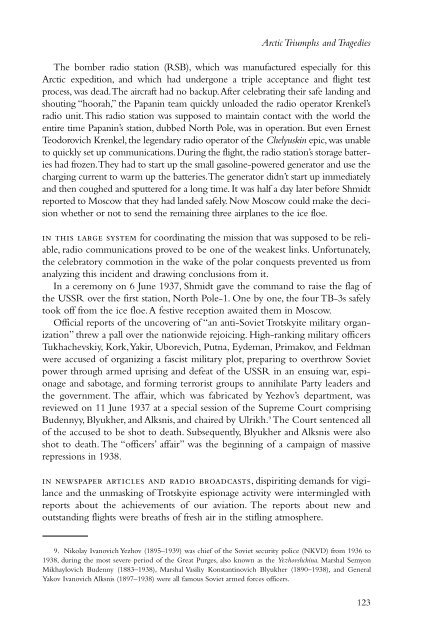to open next chapter. - NASA's History Office
to open next chapter. - NASA's History Office
to open next chapter. - NASA's History Office
Create successful ePaper yourself
Turn your PDF publications into a flip-book with our unique Google optimized e-Paper software.
Arctic Triumphs and Tragedies<br />
The bomber radio station (RSB), which was manufactured especially for this<br />
Arctic expedition, and which had undergone a triple acceptance and flight test<br />
process, was dead.The aircraft had no backup.After celebrating their safe landing and<br />
shouting “hoorah,” the Papanin team quickly unloaded the radio opera<strong>to</strong>r Krenkel’s<br />
radio unit.This radio station was supposed <strong>to</strong> maintain contact with the world the<br />
entire time Papanin’s station, dubbed North Pole, was in operation. But even Ernest<br />
Teodorovich Krenkel, the legendary radio opera<strong>to</strong>r of the Chelyuskin epic, was unable<br />
<strong>to</strong> quickly set up communications. During the flight, the radio station’s s<strong>to</strong>rage batteries<br />
had frozen.They had <strong>to</strong> start up the small gasoline-powered genera<strong>to</strong>r and use the<br />
charging current <strong>to</strong> warm up the batteries.The genera<strong>to</strong>r didn’t start up immediately<br />
and then coughed and sputtered for a long time. It was half a day later before Shmidt<br />
reported <strong>to</strong> Moscow that they had landed safely. Now Moscow could make the decision<br />
whether or not <strong>to</strong> send the remaining three airplanes <strong>to</strong> the ice floe.<br />
in this large system for coordinating the mission that was supposed <strong>to</strong> be reliable,<br />
radio communications proved <strong>to</strong> be one of the weakest links. Unfortunately,<br />
the celebra<strong>to</strong>ry commotion in the wake of the polar conquests prevented us from<br />
analyzing this incident and drawing conclusions from it.<br />
In a ceremony on 6 June 1937, Shmidt gave the command <strong>to</strong> raise the flag of<br />
the USSR over the first station, North Pole-1. One by one, the four TB-3s safely<br />
<strong>to</strong>ok off from the ice floe.A festive reception awaited them in Moscow.<br />
Official reports of the uncovering of “an anti-Soviet Trotskyite military organization”<br />
threw a pall over the nationwide rejoicing. High-ranking military officers<br />
Tukhachevskiy, Kork,Yakir, Uborevich, Putna, Eydeman, Primakov, and Feldman<br />
were accused of organizing a fascist military plot, preparing <strong>to</strong> overthrow Soviet<br />
power through armed uprising and defeat of the USSR in an ensuing war, espionage<br />
and sabotage, and forming terrorist groups <strong>to</strong> annihilate Party leaders and<br />
the government. The affair, which was fabricated by Yezhov’s department, was<br />
reviewed on 11 June 1937 at a special session of the Supreme Court comprising<br />
Budennyy, Blyukher, and Alksnis, and chaired by Ulrikh. 9 The Court sentenced all<br />
of the accused <strong>to</strong> be shot <strong>to</strong> death. Subsequently, Blyukher and Alksnis were also<br />
shot <strong>to</strong> death. The “officers’ affair” was the beginning of a campaign of massive<br />
repressions in 1938.<br />
in newspaper articles and radio broadcasts, dispiriting demands for vigilance<br />
and the unmasking of Trotskyite espionage activity were intermingled with<br />
reports about the achievements of our aviation. The reports about new and<br />
outstanding flights were breaths of fresh air in the stifling atmosphere.<br />
9. Nikolay Ivanovich Yezhov (1895–1939) was chief of the Soviet security police (NKVD) from 1936 <strong>to</strong><br />
1938, during the most severe period of the Great Purges, also known as the Yezhovshchina. Marshal Semyon<br />
Mikhaylovich Budenny (1883–1938), Marshal Vasiliy Konstantinovich Blyukher (1890–1938), and General<br />
Yakov Ivanovich Alksnis (1897–1938) were all famous Soviet armed forces officers.<br />
123
















